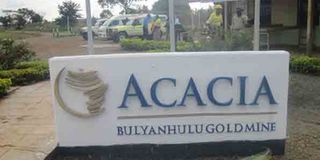Acacia Mining seeks arbitration to end row

What you need to know:
- The announcement was made yesterday, only a day after Parliament approved two bills that seek to give Tanzanians absolute ownership of all natural resources.
Dodoma. Gold miner Acacia Mining has sought arbitration to settle its dispute with the government.
The announcement was made yesterday, only a day after Parliament approved two bills that seek to give Tanzanians absolute ownership of all natural resources.
“Acacia announces that today Notices of Arbitration were served in Tanzania on behalf of Bulyanhulu Gold Mine Limited (BGML), the owner of the Bulyanhulu mine, and Pangea Minerals Limited (PML), the owner of the Buzwagi mine,” the company said in a statement.
The notices, it added, referred the current disputes between the government and BGML and PML to arbitration as provided for under the dispute resolution processes agreed by the parties.
On Monday Parliament passed the Natural Wealth and Resources Contracts (Review and Re-negotiation of Unconscionable Terms) Bill, 2017 and the Natural Wealth and Resources (Permanent Sovereignty) Bill, 2017, which state that all natural resources belong to Tanzania and will be utilised only for the benefit of the country.
The bills also seek to make it illegal for investors to send complaints regarding investments in Tanzania to any court outside the country and that all grievances will be handled by the country’s legal system.
Under the proposed laws, Parliament will be empowered to endorse arrangements or agreements between the government and investors, while all past and prospective arrangements or agreements will be reviewed and renegotiated whenever Parliament deems fit.
All the money obtained through natural resources will be kept in commercial banks within Tanzania and investors will be allowed to repatriate their dividends only.
The government will also own at least 16 per cent of shares in mining firms and the ownership will increase to 50 per cent with time. Exports of raw natural resources are also to be outlawed.
Addressing a public rally in Geita yesterday, President John Magufuli directed the Ministry of Energy and Minerals to suspend issuance of mining licences to investors.
He also ordered a review of existing licences to determine their economic benefit to the country.
Meanwhile, Acacia said yesterday that the serving of the notices was necessary to protect the company, adding that a negotiated resolution was the preferable outcome to the current disputes.
“The company will continue to work to achieve this,” it said.
The development came after the government informed Barrick Gold Corporation of its intention to discuss the matter.
Acacia said yesterday that it would not participate directly in the planned discussions, noting, however, that it would work with Barrick in any resolution that would be agreed.
“Any potential resolution that might be identified as a result of such discussions will be subject to approval by Acacia, and the company will work with Barrick as necessary to support such discussions.
“All three of our mines are continuing to operate in line with previous announcements, and we will provide an update on developments, including the proposed mining legislation, once the legislative process is complete.”
The dispute between the government and Acacia began when President Magufuli banned the export of metallic mineral concentrates in March.
Dr Magufuli then formed a team of experts in geology, chemicals and scientific analysis – led by Prof Abdukarim Mruma – to determine the actual mineral quantity in the concentrates.
The team released its findings in May, showing that the value of minerals within concentrates in containers held at Dar es Salaam Port was more than ten times the declared amount.
The committee said Acacia had not fully declared all minerals contained in the concentrates and advised the government to maintain its ban on the shipping out of the compounds.
Another committee said in its report that Acacia – which is owned by Canada-based Barrick Gold Corporation – was not registered in the country.
It also said Tanzania lost Sh108 billion in the last two decades due to under-declaration of minerals.




